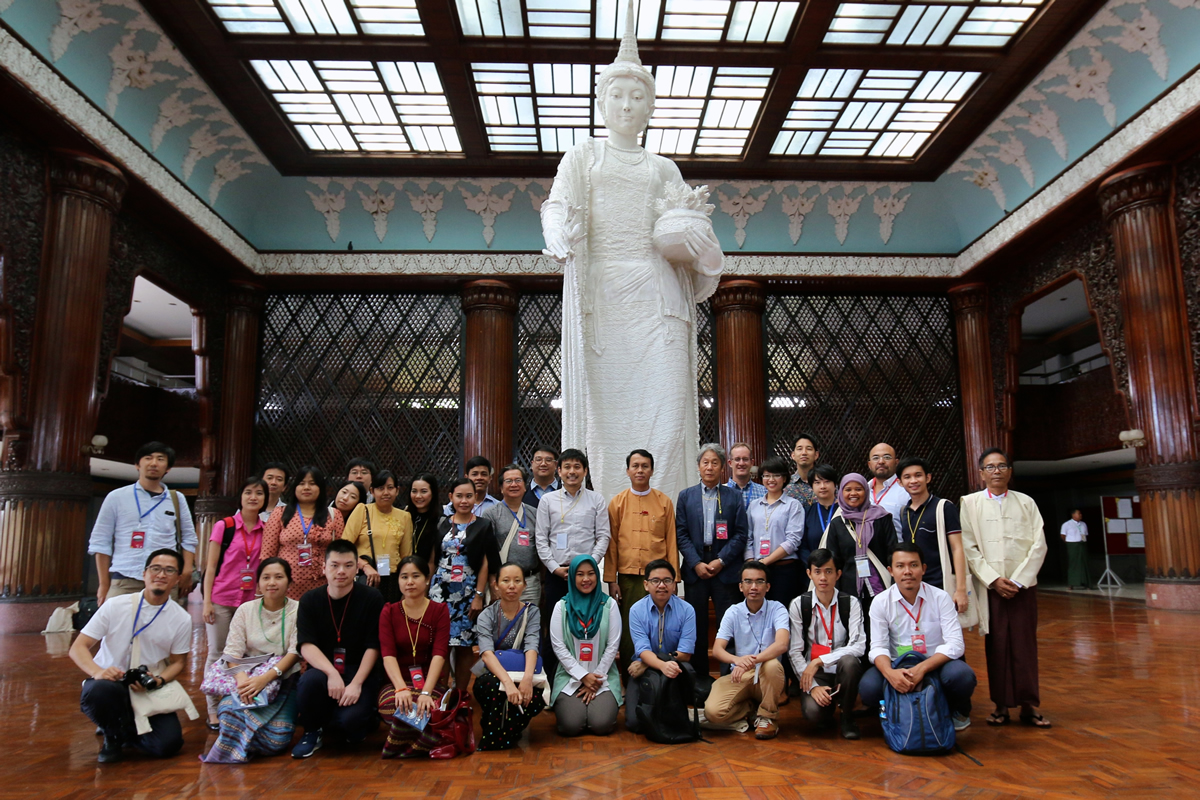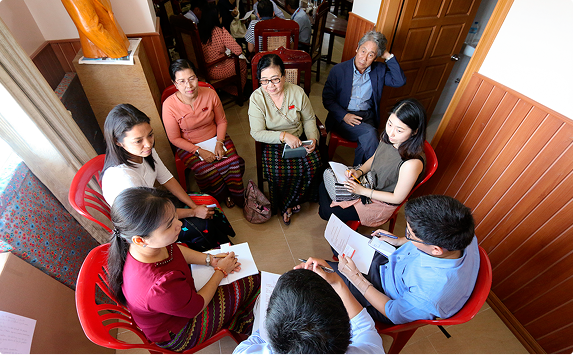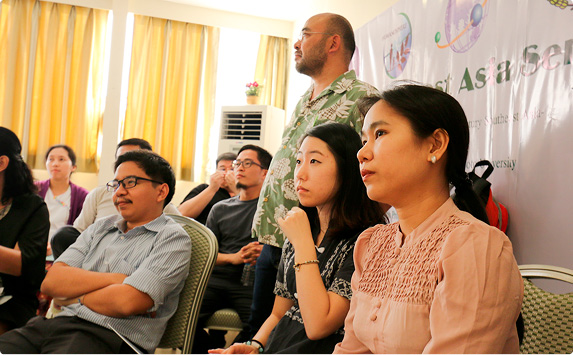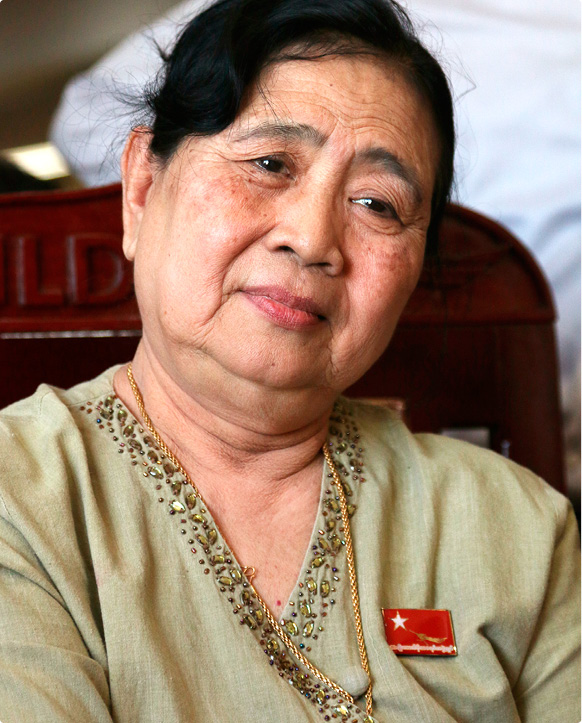
Fig.1 Participants at the regional parliament, Yangon
Southeast Asia faces uncertainty in its political development, and central to any discussion on what paths countries and the region can take is democratic governance. Since the 1980s, a wide range of experiences with democratic transition have highlighted the difficulties that characterize the region to this day. While we see increased public participation in democratic processes and the clamoring for them, this has been accompanied by opposing trends towards more authoritarian rule. For Southeast Asian citizens, government accountability has become an increasingly de facto demand despite the inability of some nations to provide this. However, the number of full-fledged democratic states in Southeast Asia is still limited. The majority can be categorized as different types of hybrid regimes whereby democratic and non-democratic elements exist side-by-side in the same political system. There is great hope for a future of more democratically oriented politics, yet at the same time there is little ground for optimism about democracy and democratization in twenty-first century Southeast Asia.

Fig.2 Participants at a group discussion at the National League for Democracy (NLD) headquarters speaking to NLD political activists
To explore these issues, between November 19–22, 2016, the Center for Southeast Asian Studies (CSEAS) and the University of Yangon held a seminar in Yangon. For one week, students from across the region came together to discuss the challenges of democracy in politics, society and natural resource management, and explore the possibility, potentiality and probability of democracy in Southeast Asia. Discussions on democracy usually home in on and identify series of political institutions, such as free and fair elections, national parliaments with sufficient authority, and competition among political parties. However, these do not function without other broader conditions such as state governability, the rule of law and accountability; a shared sense of equal citizenship, common and public knowledge of civil rights and freedom of speech; economic stability, economic inclusiveness, and physical safety. Over four days the participants explored the contours of democracies in the region, discussed the different meanings citizens ascribe to politics, conceptualizations of what constitutes democracy in the region and how variegated practices play out in the politics of natural resources management, social movements, and civil society.
In the opening session his honorable Thura U Shwe Mann, Chairman of Commission for the Assessment of Legal Affairs and Special Issues at Pyidaungsu Hluttaw and a Former Speaker of Pyithu Hluttaw, gave a speech on democratic reform, institutions building and reform processes that were carried out between 2010–16. While Myanmar still has some way to go, capacity building, fomenting confidence in the competence of the Hluttaw and democratic transformation, accepting criticisms and suggestions from both the media and the public, highlight the many challenges ahead.

Fig.3 Participants listening to group presentations
The seminar worked through three broad sessions, on politics in and of democracy; natural resources management; and social movements and civil society. The first session, examined and worked through interactions between formal institutions such as elections, the constitution of parliaments and political parties, and the increasing pressure for more democratic institutional reforms from inside and outside of ruling elites. The three speakers, Ehito Kimura (University of Hawai‘i), Min Zin (Executive Director of Institute for Strategy and Policy, Myanmar) and Ukrist Pathmanand (IAS, Chulalongkorn University) all highlighted the real challenges that Southeast Asian democracies face through a macro-regional perspective while keeping their analytical lens firmly on the current contexts, conditions and dynamism of individual countries.
The second session explored how both development and deterioration of democratic governance has affected natural resources. The past few decades have seen governance regimes increasingly exploit and extract resources from within national boundaries not only under the remit of development agendas focusing on economic growth, but also for export both within the region and further beyond. Where natural resources are utilized to further these agendas, local communities have borne the brunt of change and often struggle to resist—often violent displacements—deforestation, and agrarian management. Political expediency thus, weighs heavily on identifying “resources” and their subsequent extraction and the inevitable impact on communities. In this session, Win Myo Thu (co-founder and managing Director of EcoDev) and Dr. Lye Tuck-Po (School of Social Sciences, Universiti Sains Malaysia) both detailed the changing political ecologies of Myanmar and Malaysia and how human societies interact and impact on the rapidly changing ecopolitical landscape of Southeast Asia.
The final session on social movement and civil society scrutinized and questioned the relationship between democracy and the state in Southeast and provided a detailed examination through case studies from Cambodia and Indonesia. Themes covered included the increasingly important role of youth social movements in Cambodia and Indonesian’s government anti-corruption mechanisms and citizens’ responses to them. Both speakers, Sar Mory (Cambodia Youth Network) and Okamoto Masaaki (CSEAS) critiqued optimistic views on democracy, and through their case studies highlighted the ongoing complexity of democratization and challenges toward its implementation.

Fig.4 Former political prisoner Daw Lai Lai relating her stories to students at the NLD headquarters
The Southeast Asia seminar is never complete without a fieldtrip and a mobile workshop was organized to deepen students’ understandings of contemporary politics in Myanmar. Participants had the opportunity to talk about the current challenges to democratization with the Chief Minister of Yangon region and a visit to the regional parliament. This was followed by a visit to the National League for Democracy (NLD) headquarters to speak to NLD political activists, some of who had been imprisoned for their activities during the period under military rule. Students also visited Irrawaddy, one of the most active internet-based media groups in Myanmar to learn about how news from within Myanmar during the military dictatorship period was broadcast from outside the country. Holding this kind of seminar in Myanmar would have been unimaginable five years ago. However this is a testament to the ongoing political changes taking place, that allow open political discussions at an academic level to take place. Although the transition to democracy is a process still playing out, CSEAS hopes that it can deepen these exchanges and continue to foster dialogues with partner institutions, academics and young students in the spirit of free open exchanges on Southeast Asia’s evolving political situations.
